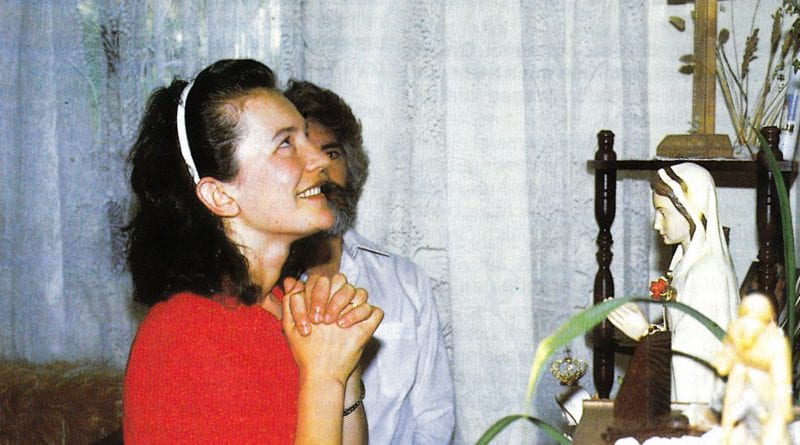Here are 7 holy habits of those who firmly trust in God, and do not give up.

I have read many biographies and memoirs of inspiring people who have placed their trust in God in a radical way. By saying “in a radical way” I do not mean to be imprudent, but I refer to the difficulty, currently very much against the current, of recognizing God above all areas of our life. In books such as He Leadeth Me, God’s Smuggler, Mother Angelica, The Heavenly Man and The Shadow of His Wings, I have found real stories of religious, consecrated and lay people, men or women who have fully trusted in God, and all have clear similarities in their approaches to life and to the Lord.
.
I found fascinating points in common in the life of these incredible people, who trusted so much with the Lord, and I decided to share them because they serve as an inspiration to others.
1. THEY HAVE ACCEPTED THE SUFFERING
One of the most powerful things I read in these memoirs is the story of Brother Yun, in the book The Heavenly Man, which tells how he was persecuted in China for being a preacher. After being tortured for weeks, with electric discharges, hunger, and nails stuck under his fingernails, he was thrown into a cell a square meter wide and tall just over one and twenty, where he would have to remain indefinitely. The day after being placed in this tiny cell, he felt moved to pray asking for a Bible, which seemed a ridiculous idea since at that time many people were in prison precisely because they found in possession of such a text. Inexplicably, the guards later pulled a Bible into his cell. He wrote:
“I knelt down and prayed, thanking the Lord for his great gift. I could not believe that my dream had come true! No prisoner was allowed to have a Bible or any book of Christian literature, but strangely God granted me a Bible! Through this action, the Lord showed me that regardless of the wickedness that those men planned for me, He had not forgotten me and controlled my life “.
Among us, someone less holy would have reacted a little differently in that situation. If I had been tortured and thrown into a coffin-like cell, my reaction to receiving a Bible would have been more like this: “Thank you for the Bible, Lord, but could we DO SOMETHING TO PULL OUT BEFORE THIS CASE ?!” . I would not even have considered the Bible an answer to my prayers, firstly because my main prayer – reducing my physical suffering – still did not get an answer.
However, what I constantly see in people like Brother Yun is that it is clear that suffering is not the worst evil of all. Sin is.Obviously they would prefer not to suffer, but this is much lower on their list of priorities than ours. They focus much more on non-sin than on not suffering. They are completely directed to bring themselves and others to heaven. In the case of Brother Yun, he saw in the response to that prayer that God allowed him to grow spiritually and to preach to his jailers, and so the circumstances of suffering and inconvenience have become almost irrelevant to him.
2. ACCEPT THE INEVITABILITY OF DEATH
As in the previous case, people who place total trust in God can do so only with a vision of the world focused on Heaven.These people think in terms of eternity, not calendar years. Their goal is not to maximize their years on earth, but to be able to bring themselves and many others to heaven. And if God wants to reduce their life time for this purpose they accept it.The book The Shadow of His Wings is full of the extraordinary stories of the miraculous escapes from the death of Father Goldmann during World War II, which makes us ask: “What happens to all people who are not escaped death? “Father Goldmann would probably answer by saying that the fact that God saved him from death was not the blessing itself – after all, each of us will eventually die – because the blessing was to save him from death so that he could continue his mission to bring the Gospel to the Nazis. He eventually died while he was building a church in Japan, and he certainly accepted that God had benefited from his death.
3. HAVE DAILY APPOINTMENTS WITH GOD
I have never heard of a person who has a deep and firm trust in the Lord and does not take a personal moment to concentrate on daily prayer. Both in the books I have read and in real life, I have noticed that this type of person spends at least a few moments – and if circumstances allow it even for an hour or two – centered only in prayer, every day. Prayer also tends to be the first thing these people do in the morning, focusing on Christ before anything else.
4. DURING PRAYER, LISTEN MORE THAN HOWEVER
Earlier I wrote of the amazement that the fact that people who have more faith in God seem to receive more answers to his prayers than most of us. I have heard stories of people asking for something specific and then receiving it; then I start to wonder if they have psychological problems or if they are pleasing to God a little more than us. The truth is that I have noticed that they do not ask for anything, but their ideas on what they should ask come directly from the Holy Spirit, since they spend a lot of time each day looking for the will of God in their lives.
I will take as an example the story published in the biography of the famous Mother Angelica of the Catholic channel EWTN.One day a satellite company employee knocked at his door demanding payment of 600 dollars. If he did not pay he would have to return the satellite dish, and this would have destroyed the projects of the new station. Mother Angelica ran to the chapel to pray, and suddenly a stranger offered to donate $ 600. His prayer did not have a quick response to his personal interest in the channel or because it was something that she really wanted, but because she knew how to correctly distinguish God’s plan that she wanted a new reality in television.
5. LIMIT THE DISTRACTIONS
Among all the extraordinary stories contained in the book God’s Smuggler, one of the parts that struck me most is the epilogue, in which the author talks about how the work of brother Andrew continues in the 21st century:
“I will not even consider one of those monstrosity of waiting calls, which interrupt a telephone conversation to announce another.” Technology, Andrew said, makes us too accessible to the demands of the moment. “Our number one priority should be to listen patiently and silently to God’s voice”.
“Too accessible to the demands of the moment”. This phrase resounded me from the moment I read it. I love technology, but this involves the great temptation to feel an increase in the urgency of our life: I need to respond to that e-mail! Answer that comment on Facebook! Rewrite that tweet! Read that direct message! Listen to that voice message! In the age of connection, we are constantly bombarded with requests that require – or seem to require – our constant attention. The periods of silence in which we can cultivate inner tranquility and wait for the whisperings of the Holy Spirit in our lives are increasingly rare.
One of the things that all of these people share is the lack of pressure for all these false urgencies. It is hard to imagine that Father Ciszeck gives his views on God who shares in his book He Leadeth Me (He guides me) while his iPhone vibrates every few minutes, or Brother Yun observing the subtle beauty of God’s plan in the middle to a persecution while keeping his Twitter updated minute by minute.
.
6. SUBJECT THEIR SPIRITUAL DISCERNMENT TO OTHERS
People who constantly observe the way God works in their lives, notice that he often speaks through fellow believers, members of the family and clergy. If they discern that God is calling them to something, especially if it is something great, they ask other Christians of their confidence to pray for the matter to see if they too discern the same call of the Lord. And when others warn them not to follow certain paths – especially if it is their spouse, confessor or spiritual director – they take these advice very seriously.
7. PROVIDE A COMPLETE AND UNCONDITIONAL OBEDIENCE TO THE LORD
One of my favorite passages from God’s Smuggler is the one in which Brother Andrew receives a visit from a man named Karl de Graaf, who was part of a prayer group where people prayed for a long time, but above all listened in silence.
“I approached the vestibule and there was Karl de Graaf. “Hi,” I said surprised.
“Hi, Andy. Can you drive? “
“To drive?”
“A car”
“No,” I said. “I do not know how to do it”
“Yesterday during the prayer we received a word from the Lord about you. It is important that you learn to drive “.
“Why?” I asked. “Surely I will never have a car of my own”
“Andrew,” said Mr. de Graaf patiently, as if addressing someone with learning difficulties, “I’m not arguing about the logic of the case, I’m just sending you the message.”
Despite the initial indecision, Brother Andrew managed to distinguish the Lord’s call in that message, and he learned to drive. It seemed a complete waste of time, an illogical waste of its resources, but it obeyed the Lord’s call. After taking the license, knowing how to drive was fundamental for the future of his mission, which brought the word of the Gospel to thousands of people in the European communist bloc.
I like to think of the answer that Mr. de Graaf gave to Brother Andrew when he asked him about the meaning of the strange message of the Lord: “This is the emotion of obedience,” he told him, “to find out after what was the project in the mind of God”.
Of course we can not draw closer to God by imitating the actions of others, but we can find examples like these that help us reflect on our spiritual progress. I hope they served you as they served me.
Edited by Drafting Papaboys source Aleteia
Original art on pildorasdefe.net (translated from the Spanish by Roberta Sciamplicotti)





